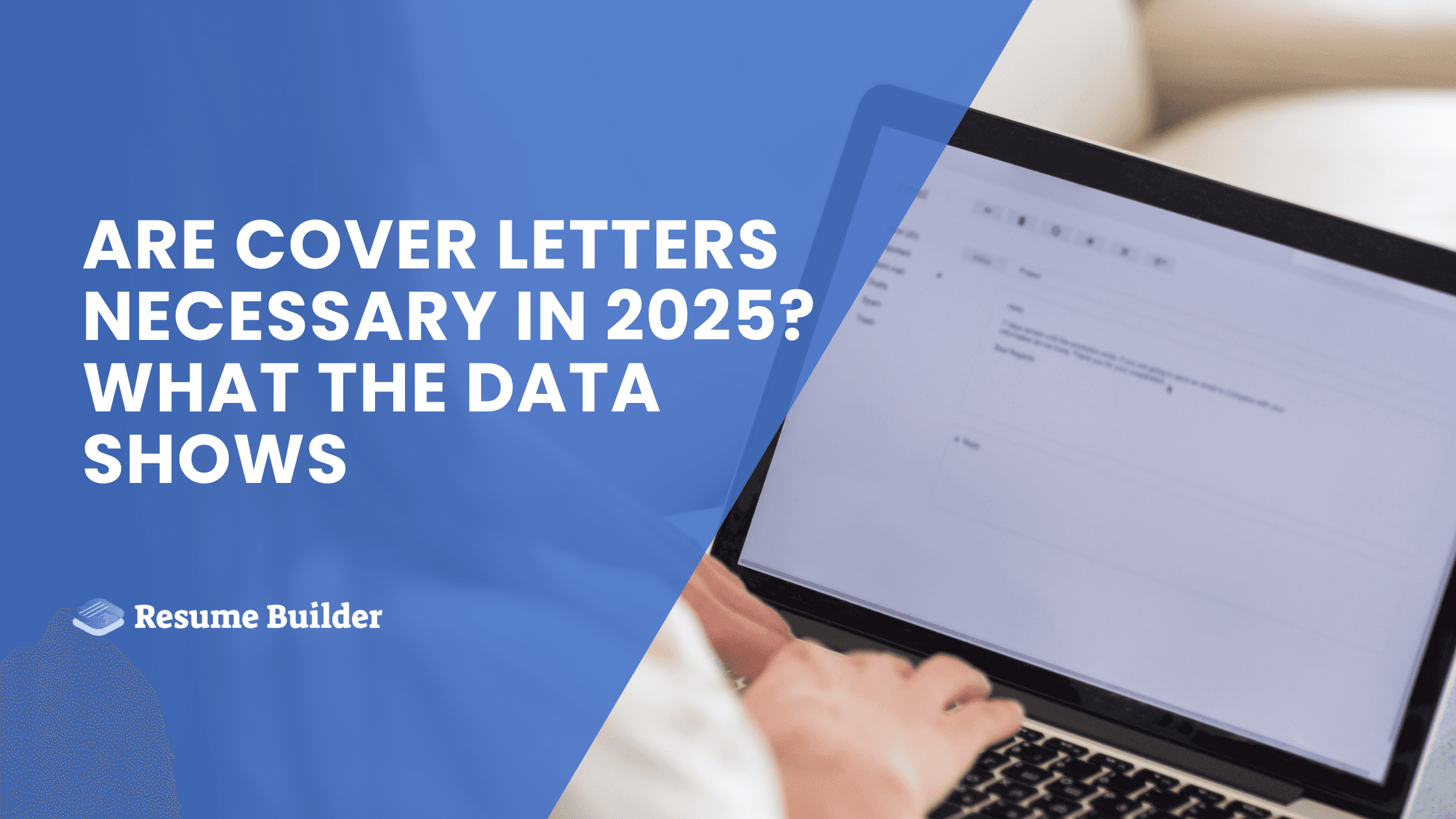Are Cover Letters Necessary in 2025? What the Data Shows

In short, yes, cover letters are necessary in 2025 given that two-thirds of recruiters expect one. However, only 38% of job seekers include them when required. This gap presents a great opportunity whether you're a recent graduate entering the workforce or a seasoned professional considering a career change. The key is to understand when and how to include a cover letter as this can make between landing an interview or being overlooked by a recruiter.
In this article, we’ll show whether cover letters are necessary, when to include them, and when to skip them. Also, we’ll provide insights on the latest data on cover letters and what hiring managers actually look for in them.
- Most recruiters expect cover letters—89% of them require one, but only 38% of applicants include one.
- A tailored cover letter boosts your chances given that applications with one get 53% more callbacks.
- You can skip submitting a cover letter in limited cases—for example, when a posting prohibits them or an online form doesn’t allow uploads.
- Legal, nonprofit, education, and healthcare fields see cover letters as essential.
- ATS-friendly formatting matters—use clear structure and keywords to ensure your letter is read.
What the Latest Data Reveals About Cover Letter Necessity?
Latest data paints a clear picture of cover letter relevance in modern hiring. A report showed that 89% of recruiters expect a cover letter. This statistic alone should settle most debates about cover letter necessity.
The numbers become even more compelling when you look at interview rates. Applications with tailored cover letters receive callbacks 53% more often than those without. However, many job seekers continue to skip this crucial step, often citing time constraints or uncertainty about effectiveness.
This gap between employer expectations and candidate behavior has created an unintended advantage for job seekers who consistently include well-written cover letters. According to a survey, only 38% of applicants provide them when required. Therefore, including a cover letter automatically makes you stand out from the majority.
When Are Cover Letters Absolutely Necessary?
Cover letters are necessary in almost every situation given the above-mentioned statistics. However, some situations should be particularly highlighted. Let’s examine five different situations when cover letters are absolutely necessary.
#1. Job Postings That Explicitly Require Cover Letters
When a job posting explicitly requires a cover letter, there's no room for interpretation. These requirements typically appear in traditional industries and senior-level positions where communication skills are paramount.
Legal firms, consulting companies, and academic institutions frequently mandate cover letters because they view them as the first demonstration of a candidate's writing skills and attention to detail.
Unlike optional cover letters, missing required ones signals to employers that you either can't follow directions or don't care enough about the position to complete the full application. Either impression is fatal to your candidacy.
#2. Direct Email Applications
When applying directly via email, cover letters become even more critical. Email applications require some form of introduction—you can't simply attach the resume you’ve written without context.
Furthermore, direct applications often reach decision-makers more quickly than portal submissions, making first impressions crucial. A well-crafted email can immediately convey professionalism and genuine interest in the position, while a bare one with only a resume attachment often appears lazy or impersonal.
#3. Creative and Communication Roles
Positions in public relations, journalism, copywriting, and similar fields typically require cover letters because they demonstrate essential job skills. Creative industries use cover letters to assess cultural fit and creative thinking. A marketing manager position might require a cover letter that demonstrates brand voice understanding, while a journalism role might expect news writing style and research skills.
In these contexts, skipping the cover letter isn't just missing an opportunity—it's failing to provide essential evidence of your qualifications.
#4. Career Change or Employment Gaps
If you’re a career changer, you need a cover letter to connect your unrelated experiences to the target role. Without this context, hiring managers may struggle to understand how your background translates to their needs.
Similarly, employment gaps require explanations that any resume format alone can't provide. With a cover letter, you can briefly address career breaks and redirect attention to your qualifications and enthusiasm for returning to work. The key is to address the gaps honestly but concisely.
#5. Referral Situations
Even with strong referrals, cover letters can boost your success rate significantly. The reason why lies in the fact that it provides substance beyond the connection.
A well-written cover letter in referral situations allows you to highlight how your skills and experience align with the role, giving the hiring manager context for why the referral was made. It reinforces your personal brand and ensures that your application stands out on its own merit, not just through the referral.
When Are Cover Letters "Optional"?
Even when cover letters are marked as optional, most hiring managers still expect them. This "optional" designation often reflects legal or HR policy requirements rather than actual hiring manager preferences. Companies use "optional" language to avoid discrimination claims while maintaining flexibility in their evaluation process.
Smart job seekers treat "optional" cover letters as opportunities to stand out rather than permission to skip effort. When half your competition skips the cover letter, including a compelling one immediately differentiates your application.
Which Industries Value Cover Letters the Most?
Certain industries maintain stronger preferences for cover letters regardless of whether they're explicitly required. The table below outlines industries that value cover letters, and why they’re important:
| Industry | Expectation | Why It Matters |
|---|---|---|
Healthcare | Strongly expected, even for technical positions | Patient communication and professional responsibility make written communication skills critical. Hiring managers assess your ability to convey complex medical information clearly. |
Education | Highly valued at all levels | The sector emphasizes communication, curriculum development, and stakeholder engagement. Cover letters demonstrate passion for learning and student success beyond credentials. |
Nonprofit | Essential for mission-driven roles | Mission alignment is crucial for long-term success. Cover letters provide space to demonstrate understanding of and commitment to the organization's cause beyond technical qualifications. |
Finance & Banking | Expected for client-facing positions | Trust, professionalism, and attention to detail are paramount. Cover letters showcase your understanding of financial regulations and client relationship management. |
Legal | Required standard practice | Written communication is fundamental to legal work. Cover letters demonstrate analytical thinking, precision, and ability to construct persuasive arguments. |
Sales & Marketing | Critical differentiator | Your sales cover letter is your pitch. It demonstrates persuasive writing, understanding of value propositions, and ability to communicate benefits effectively. |
Government & Public Sector | Mandatory in most cases | Formal application processes require comprehensive documentation. Cover letters address selection criteria and demonstrate understanding of public service values. |
When Can You Skip the Cover Letter?
While cover letters are valuable in most situations, there are legitimate scenarios where they're unnecessary or even unwanted, aside from being explicitly told not to include one.
Let’s examine three scenarios when you can skip a cover letter to save time and demonstrate your ability to follow instructions:
- Online application systems don't allow uploads. Some applicant tracking systems only accept resumes. In these situations, you obviously can't include a cover letter as the system won't accept it. However, this scenario is rare as most modern ATS platforms recognize the importance of complete application packages. When systems don't allow cover letter uploads, leverage your resume summary to ensure important context isn't lost entirely.
- Skills-based hiring. Certain technical positions, particularly in software engineering and data science, focus almost entirely on technical skills rather than communication abilities. Many tech companies have moved toward skills assessments, coding challenges, and portfolio reviews that provide more relevant evaluation criteria than written communication.
- Quick apply job boards. LinkedIn Easy Apply and similar one-click application features generally don't accommodate cover letters, and the implied value proposition is convenience over customization. These applications are designed for volume rather than personalization.
What Hiring Managers Look for in Cover Letters?
Hiring managers prioritize tailored content that creates clear connections between your experience and specific job requirements.
Most hiring managers can distinguish generic from customized cover letters within the first paragraph. Generic letters focus on what the candidate wants, while effective letters demonstrate understanding of what the employer needs.
Successful customization goes beyond using the company name and job title. It requires researching the company, understanding industry context, and positioning your background as the solution to specific problems the role was created to solve.
Furthermore, cover letters serve as cultural fit assessments as much as qualification summaries. Hiring managers want to see evidence that you understand company values, recent developments, and industry position—information that suggests genuine interest rather than mass application approaches.
However, this doesn't mean reiterating company website copy. Instead, demonstrate understanding through specific examples of how your values align with company culture or how your experience addresses challenges the company faces.
The most important thing to remember is that effective cover letters include specific examples with measurable outcomes rather than vague claims about being "results-oriented" or a "team player." Instead of stating "I improved customer satisfaction," try "I redesigned the customer onboarding process, reducing complaint calls by 34% and improving satisfaction scores from 7.2 to 8.9 out of 10."
These concrete examples provide evidence of your capabilities while demonstrating your ability to think in business terms and measure success objectively.
ATS and Cover Letters
The reality of modern hiring is that your cover letter must first survive applicant tracking systems (ATS) before any human reads it. This is especially present at large corporations and enterprise companies that receive hundreds of applications per position.
For ATS optimization, format matters as much as content. Here’s a short table explaining how to optimize your cover letter for ATS.
| Aspect | Best Practice | Example/Implementation |
|---|---|---|
Font Choice | Use standard, ATS-friendly fonts | Arial, Calibri, Times New Roman, or Georgia at 10-12pt size |
Formatting Elements | Avoid complex formatting that confuses parsers | No tables, text boxes, columns, headers, footers, or graphics |
File Format | Save as ATS-compatible document types | Word (.docx) or PDF with selectable text (not scanned images) |
Document Structure | Submit as separate file from resume | "JohnSmith_CoverLetter.docx" and "JohnSmith_Resume.docx" as two files |
Keyword Integration | Use job description language naturally | If posting mentions "consultative selling," use that exact phrase in context |
Industry Terminology | Include relevant technical terms | "Salesforce CRM," "quota attainment," "pipeline management," "SaaS sales cycle" |
Keyword Placement | Distribute throughout, not clustered | Weave terms into achievement stories: "Exceeded quota by 127% using consultative selling approach" |
Create or Optimize Your Cover Letter With ResumeBuilder.so
Creating a compelling cover letter doesn't have to start from scratch. ResumeBuilder.so offers an AI-powered resume and cover letter builder and variety of cover letter templates.
For inspiration, the platform provides proven cover letter examples for various scenarios. Furthermore, built-in ATS optimization ensures proper formatting and keyword integration, so your materials pass automated screening.
Final Thoughts
Still wondering “Are cover letters necessary in 2025?” The available data supports their continued importance, with 89% of recruiters expecting one.
Therefore, cover letters remain necessary but have evolved in purpose and execution. They now serve as strategic communication tools that provide context, demonstrate cultural fit, and differentiate candidates in competitive markets rather than simple introduction letters.
The approach to cover letters should be situational: always include them when required, include them for optional applications unless specifically prohibited, and focus on quality over mere presence.

